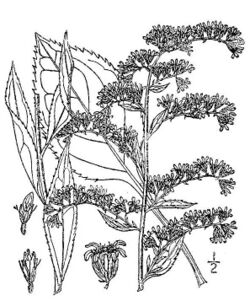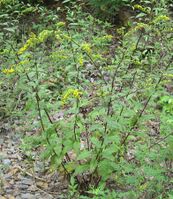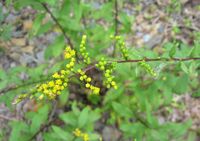Biology:Solidago arguta
| Solidago arguta | |
|---|---|

| |
| 1913 illustration[1] | |
| Scientific classification | |
| Kingdom: | Plantae |
| Clade: | Tracheophytes |
| Clade: | Angiosperms |
| Clade: | Eudicots |
| Clade: | Asterids |
| Order: | Asterales |
| Family: | Asteraceae |
| Genus: | Solidago |
| Species: | S. arguta
|
| Binomial name | |
| Solidago arguta Aiton
| |
| Synonyms[2] | |
| |
Solidago arguta, commonly called Atlantic goldenrod,[3] cut-leaf goldenrod,[4] and sharp-leaved goldenrod,[4] is a species of flowering plant native to eastern and central North America. It grows along the Gulf and Atlantic states of the United States from Texas to Maine, inland as far as Ontario, Illinois, and Kansas .[5] It is primarily found in areas of woodland openings, such as outcrops or clearings.
Description
Solidago arguta is a tall fall-flowering perennial. Flowers are small, yellow, and in heads. It can be distinguished from similar goldenrods by its broad basal leaves that are lightly pubescent to hairless, which decrease in size towards the apex of the stem.[4]
galls
This species is host to the following insect induced gall:
- Asteromyia carbonifera (Osten Sacken, 1862)
Taxonomy
Four varieties are recognized by most authors. They are:[2][4][6]
- Solidago arguta var. arguta - With hairless achenes; native to the Appalachian Mountains and the Northeast
- Solidago arguta var. boottii (Hook.) E.J.Palmer & Steyerm. - With pubescent achenes and leaves; native to the Ozark Mountains and the Gulf Coastal Plain
- Solidago arguta var. caroliniana (Gray) G.H.Morton - With pubescent achenes and hairless leaves; native across the Southeastern United States
- Solidago arguta var. harrisii Cronquist - With thick-textured, truncate basal leaves; native to the Central Appalachians
Due to its morphological distinctiveness and narrow geographic range, some modern taxonomists treat variety harrisii as a full species (named Solidago harrisii).[6][7]
References
- ↑ USDA-NRCS PLANTS Database / Britton, N.L., and A. Brown. 1913. Illustrated flora of the northern states and Canada. Vol. 3: 393.
- ↑ 2.0 2.1 The Plant List, Solidago arguta Aiton
- ↑ "Solidago arguta". Natural Resources Conservation Service PLANTS Database. USDA. https://plants.usda.gov/core/profile?symbol=SOAR. Retrieved 18 November 2015.
- ↑ 4.0 4.1 4.2 4.3 Flora of North America
- ↑ Biota of North America Program 2014 county distribution map
- ↑ 6.0 6.1 Alan Weakley (2015). "Flora of the Southern and Mid-Atlantic States". http://www.herbarium.unc.edu/flora.htm.
- ↑ Asteraceae Lab at the University of Waterloo, by John Semple
Wikidata ☰ Q15566731 entry
 |



